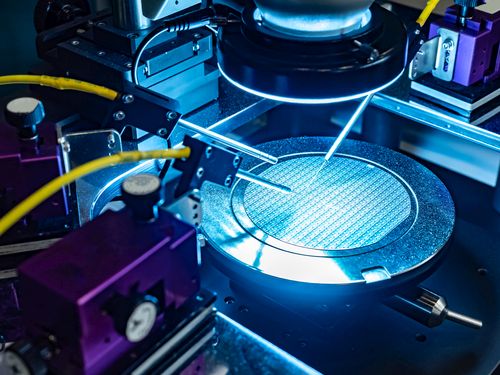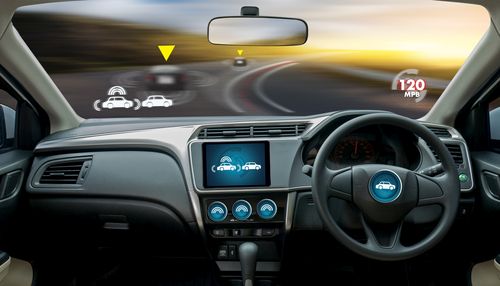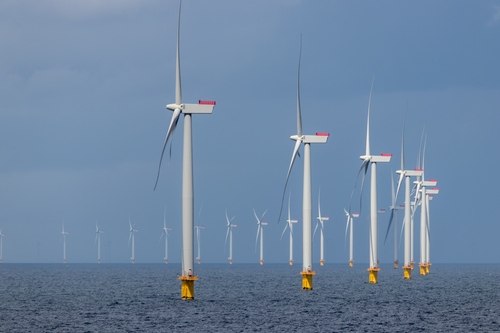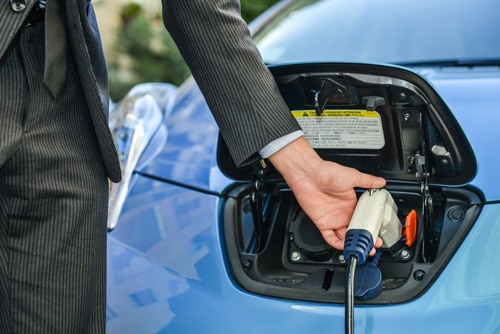SK continues to invest large sums in the development of computer chips
SK hynix is stepping up its commitment to the semiconductor business to meet the current high global demand of computer chips. As the world’s second largest manufacturer of DRAM memory, the company has signed a $4.3 billion purchase agreement with Dutch machine manufacturer ASML Holding. SK hynix will purchase ASML’s EUV scanners for semiconductor production over a five-year period and integrate them into their production. This step for the expansion of the production numbers at SK hynix takes place in a period which is called “Super Cycle” by experts. During a Super Cycle, the demand of computer chips increases rapidly. By purchasing the advanced machines, the chipmaker can ensure mass production of next-generation chips. Payment for the machines is made in installments over a five-year period.

An EUV beam has a wavelength 14 times smaller than the currently used ArF laser. EUV and ArF are used to engrave transistors on silicon wafers. So far, only Samsung’s TSMC uses this novel technology. Another financial burden SK hynix is facing is the acquisition of Intel’s flash memory business. The first installment of $7 billion must be paid by the end of this year, with the remaining amount due by 2025. So far, it is not known how much SK hynix’s exact investment in the EUV machines will be.However, industry insiders expect at least a three-digit million sum. SK hynix also announced that it would commission a total of up to three EUV equipment manufacturers.The cost for a single plant is approximately 175 million US dollars. The EUV production facility will be integrated into the recently unveiled M16 business plan, which aims to produce next-generation DRAM memory. Some experts expect 20 percent growth in flash memory and 17 percent in DRAM this year. The high demand for smartphones and the construction or expansion of data centers are the reason for this positive development.
South Korea is considered one of the most important and innovative industrial nations in the world. Many products that are imported to South Korea have to be tested and certified in advance. MPR International GmbH recommends itself as a partner for your Korea certification. We will gladly check for you without obligation whether your products are subject to certification and prepare an attractive offer for you.
If you need assistance or have any questions regarding Korean certifications like KC, KC EMC, KCs or KCs for explosion safety products, feel free to contact us any time.
Tel.: +49-69-2713769259
Email: info@korea-certification.com
Urgent questions?
Please do not hesitate to contact us via chat. You will find the chat window at the bottom right of each page (if this is not visible, please check your browser settings).
For more information you can download our free brochure “Korea Certification Made Easy – The Booklet“.
South Korea invests heavily in the development of self-driving cars
South Korea will invest $999 million in self-driving car technology development projects and related infrastructure over the next few years. This was announced by a government spokesperson in mid-January 2021. The investment period extends to 2027, with numerous ministries and institutions participating in the investment. Among those named were the Ministry of Trade, Industry and Energy; the Ministry of Science and Information Technology; the Ministry of Land, Infrastructure and Transport; and the National Police Agency. Together, these institutions plan to fund various projects as well as promote the commercialization of self-driving vehicles.

Domestic automakers and suppliers are also to receive corresponding support from the government if they participate in the projects. According to the Ministry of Transport, the funds will be used mainly for the development of technology and adaptation to global standards in the field of autonomous driving and the interconnection of road infrastructure with the self-driving vehicles. The government plans to have level 4 self-driving cars ready for the market and introduction in 2027. In level 4, a car can drive autonomously under certain circumstances and only needs the intervention of a driver in exceptional situations. In South Korea, Hyundai Mobis Co, the parts supplier of Hyundai Motor Group, has taken the lead in developing technology for use in self-driving cars.
The group plans to integrate Level 3 autonomous driving technology into its vehicles in 2022. Hyundai Mobis, meanwhile, is collaborating with international automakers to develop technology for level 4 and 5 self-driving vehicles. To explain, a level 3 vehicle can independently change lanes and navigate moving traffic when the technology is fully deployed. At Level 5, a vehicle is capable of driving itself under all conditions and without driver intervention. Vehicle components, which include assistance systems for autonomous driving, must undergo certification for the KC mark or KC certificate in Korea. Our experts are always available to answer any questions without obligation.
If you need assistance or have any questions regarding Korean certifications like KC, KC EMC, KCs or KCs for explosion safety products, feel free to contact us any time.
Tel.: +49-69-2713769259
Email: info@korea-certification.com
Urgent questions?
Please do not hesitate to contact us via chat. You will find the chat window at the bottom right of each page (if this is not visible, please check your browser settings).
For more information you can download our free brochure “Korea Certification Made Easy – The Booklet“.
South Korea unveils plans for the world’s largest offshore wind farm
South Korea announced details in early February 2021 for plans to build the world’s largest offshore wind farm off the coast of Sinan, South Korea. The project is worth $43.2 billion, is scheduled for completion in 2030, and is part of a government initiative to revitalize the economy in a green way after the Covid 19 pandemic. The wind farm is a key component of South Korea’s President Moon’s Green New Deal campaign, launched last year. The campaign aims to reduce Asia’s fourth-largest economy’s dependence on fossil fuels and make it carbon-neutral by 2050.

President Moon attended the signing ceremony in the southwestern coastal city of Sinan, where the wind farm will be built. When completed, the offshore wind farm is expected to have a maximum capacity of 8.2 gigawatts. Moon said at the ceremony that this project will accelerate the energy transition to environmentally friendly and carbon-neutral power generation. Utility and engineering companies were also present, including Korea Electric Power Corp, SK E&S, Hanwha Engineering & Construction Corp, Doosan Heavy Industries & Construction Co, CS Wind Corp and Samkang M&T Co.
The companies will contribute the lion’s share of the investment, 98 percent, with the government funding the remaining 2 percent, a spokesman for the President’s House announced. The project will create up to 5,600 jobs and contribute to the country’s goal of expanding its energy from wind power from the current 1.67 gigawatts to 16.5 gigawatts by 2030. The wind farm’s 8.2 gigawatts of power is equivalent to six nuclear power plants and reduces CO2 emissions that the equivalent of 71 million trees would absorb, an official said. Currently, the worlds largest offshore wind farm is Hornsea 1 in England, with a capacity of 1.12 gigawatts. MPR International GmbH – Korea Certification offers certification services for all product areas, especially electronics, KC EMC certification for electronic products, KCs certification for machinery and KCs for explosion-proof products. We are available to answer any questions you may have about Korea certifications. Let us advise you free of charge!
If you need assistance or have any questions regarding Korean certifications, feel free to contact us any time.
Tel.: +49-69-2713769259
Email: info@korea-certification.com
Urgent questions?
Please do not hesitate to contact us via chat. You will find the chat window at the bottom right of each page (if this is not visible, please check your browser settings).
For more information you can download our free brochure “Korea Certification Made Easy – The Booklet“.
Exports of electric cars from South Korea increased sharply
According to a recent report, exports of electric cars from South Korea increased by 66 percent year-on-year. As a result, this sector bucked the general negative trend in the automotive industry due to the Covid 19 pandemic. The export volume of electric cars was around $3.9 billion in 2020, overtaking the value of hybrid cars for the first time, which was $2.5 billion. The data was compiled by the Korean International Trade Association. Electric cars accounted for more than half of all green car exports, which totaled US$7.1 billion in value.

Europe was the largest market for South Korea’s eco-friendly cars, accounting for 68 percent of the total. Worldwide, South Korea also shipped 955 fuel cell vehicles in 2020. This represents 26.3 percent growth over the previous year. The country was the fourth largest exporter of electric cars in the January-September 2020 period, according to the trade association. The value for exports of motor vehicles from South Korea in general reached $37.4 billion in 2020, a loss of 13.1 percent from the previous year and most likely attributable to the Covid 19 pandemic. These data were announced by the Korean Ministry of Trade, Industry and Energy.
The automotive industry in South Korea ranks 7th in the world in both production figures and exports. The largest manufacturers, ranked by global sales, are Hyundai, Kia, GM Korea, Ssangyong and Renault Samsung. Hyundai and Kia are unchallenged in the top two spots with 59,501 and 41,481 vehicles sold in January 2021, respectively. So follows third-placed GM Korea with only 6106 units. For the electric car sector, Hyundai also signed a memorandum of understanding with the South Korean government in February. Together with other companies, LG Energy Solution and KST Mobility, electrically powered cabs are to be tested. Hyundai will supply the vehicles, the Kona Electric, and take care of the maintenance and replacement of the batteries; LG Energy Solution will provide the charging stations and KST Mobility will operate the cabs.
MPR International GmbH will be pleased to advise you regarding Korea certification in the automotive sector. We have already successfully accompanied many large automotive suppliers and vehicle manufacturers with locations in Korea in their certification projects and have been supporting these companies for several years. Our experts are available at any time by phone or e-mail to answer your questions regarding a pending Korea certification.
If you need assistance or have any questions regarding Korean certifications like KC, KC EMC, KCs or KCs for explosion safety products, feel free to contact us any time.
Tel.: +49-69-2713769259
Email: info@korea-certification.com
Urgent questions?
Please do not hesitate to contact us via chat. You will find the chat window at the bottom right of each page (if this is not visible, please check your browser settings).
For more information you can download our free brochure “Korea Certification Made Easy – The Booklet“.



